Adapt Alternatives: Best B2B Data Providers 2025
How to Choose the Right Adapt Alternative: Top B2B Data Platforms to Power Your Sales Pipeline
Blogby JanMay 28, 2025
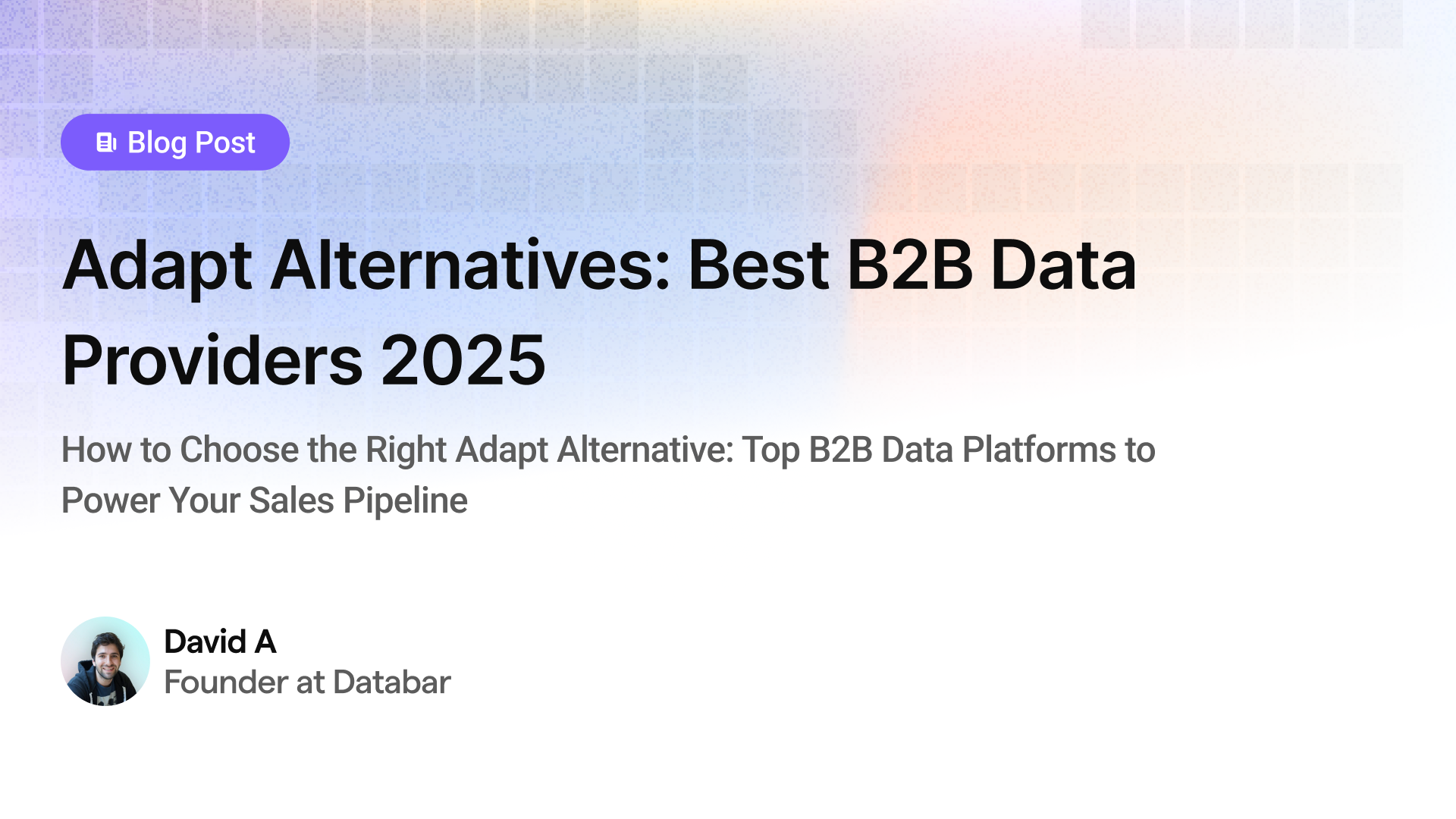
Finding the right B2B data provider shouldn't feel like searching for a needle in a haystack. Most sales teams spend considerable time dealing with incomplete contact information, outdated company data, and platform limitations that slow down their prospecting efforts.
Here's what you need to know about the top Adapt alternatives in 2025:
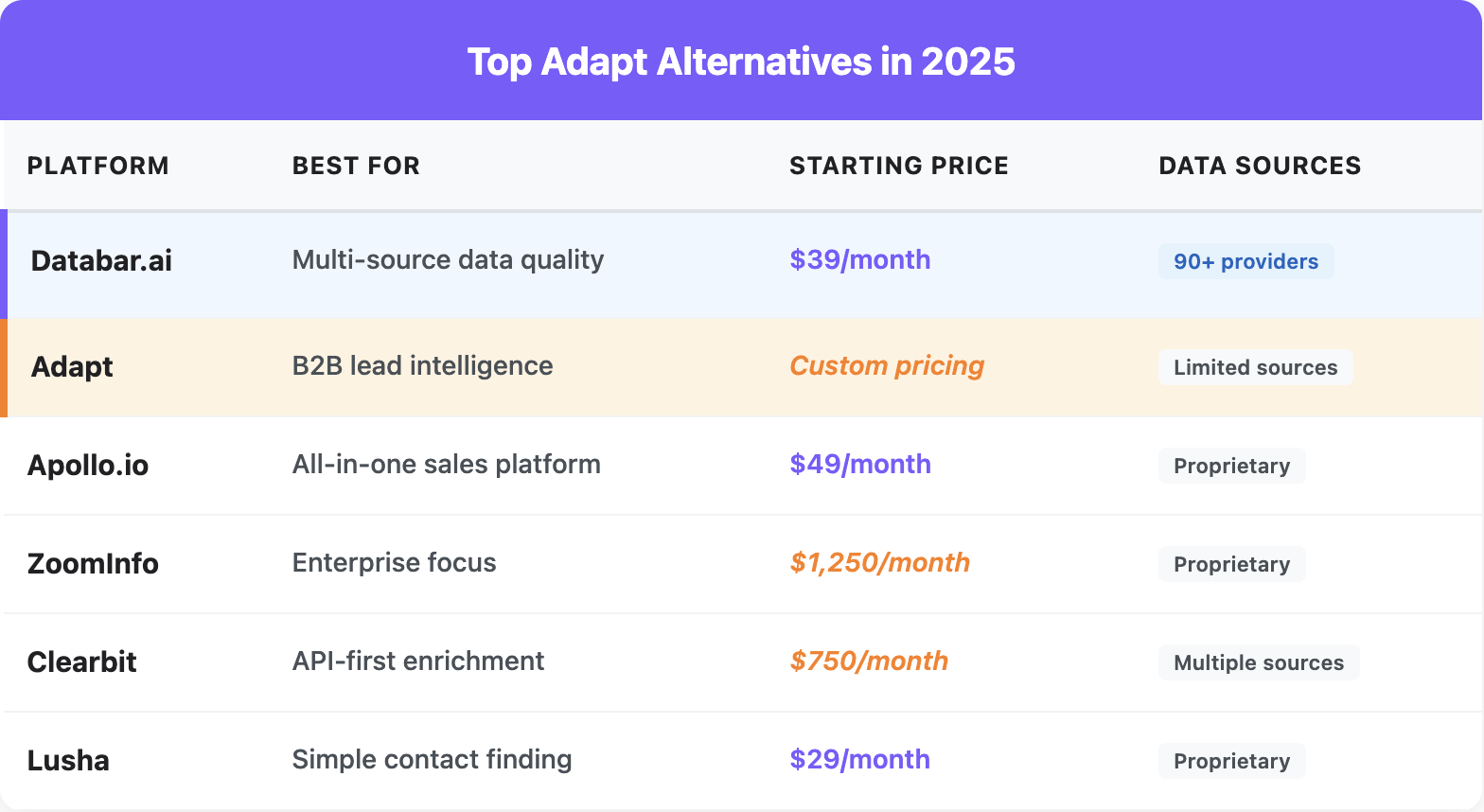
This detailed analysis examines why thousands of sales professionals are exploring alternatives to Adapt's platform to find better data coverage, pricing transparency, and integration capabilities. You'll discover which alternative delivers the highest ROI for your specific use case, team size, and budget constraints.
Understanding Adapt: Platform Overview and Areas for Improvement
Adapt has positioned itself as a B2B lead intelligence platform offering prospecting, enrichment, and API integration features. The platform serves marketing and sales teams looking to access accurate contact data through a Chrome extension and API-based approach.
What Adapt does well:
- Chrome extension for real-time data collection
- API integration capabilities for workflow automation
- Focus on data accuracy and verification
- Support for multiple export formats
Areas where teams seek alternatives:
Data coverage limitations affect many users, particularly those targeting niche industries or international markets. Adapt's reliance on limited data sources can create blind spots in contact discovery, especially for emerging markets and specialized professional roles. Teams considering global prospecting may want to evaluate providers with broader international coverage.
Pricing transparency challenges create budget uncertainty. Unlike competitors with clear monthly subscriptions, Adapt's custom pricing model makes it difficult for teams to predict costs or scale efficiently as their data needs grow.
Integration complexity can slow down implementation. Many users experience challenges connecting Adapt with existing CRM systems, marketing automation platforms, and sales engagement tools, requiring additional technical resources.
Limited global coverage may restrict international expansion efforts. Teams operating across multiple regions sometimes find inconsistent data quality and coverage, particularly in APAC and emerging European markets.
These considerations have created opportunities for innovative, flexible alternatives that address modern sales teams' evolving needs.
1. Databar.ai
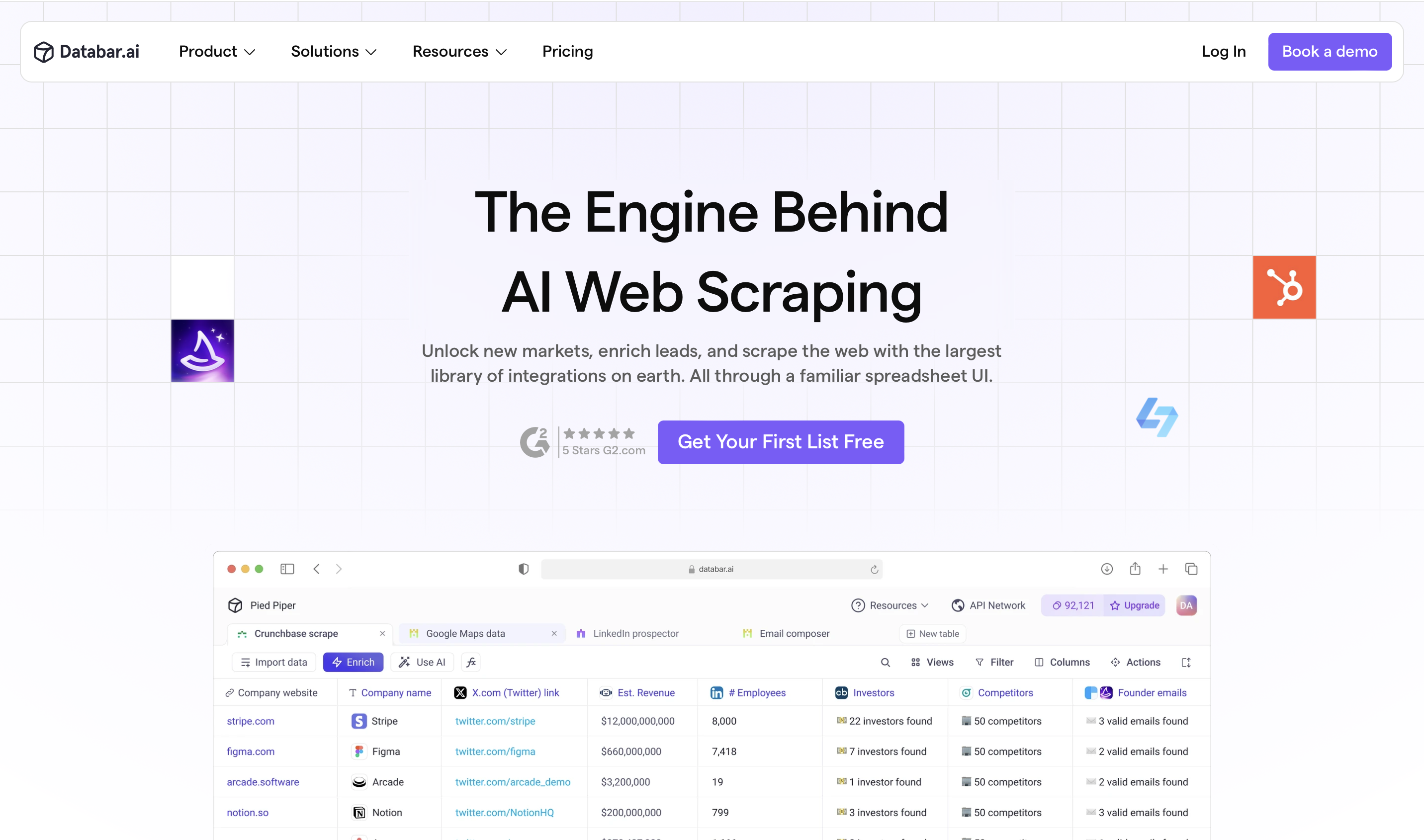
Databar.ai fundamentally changes how sales teams approach B2B data by providing access to over 90 specialized data providers through a single, intuitive platform. This multi-source approach directly addresses Adapt's core limitation of relying on limited data sources.
Why Databar.ai stands out from Adapt:
Excellent data coverage comes from aggregating information across dozens of specialized providers rather than maintaining a single database. When one provider can't find a contact's email, Databar.ai automatically searches through Hunter.io, RocketReach, Lusha, and dozens of other providers until it locates verified information.
Transparent, flexible pricing starts at just $39 monthly with clear credit-based consumption. Teams pay only for successful data enrichment, avoiding the uncertainty of Adapt's custom pricing structure while scaling costs predictably with usage.
Advanced automation capabilities include AI-powered research agents that can visit websites, extract specific information, and compile detailed prospect profiles. This goes far beyond basic contact lookup to deliver actionable intelligence.
Global data access emerges from tapping into regional specialists and local data providers. European teams benefit from GDPR-compliant sources while APAC operations access region-specific data providers.
Enterprise-grade integrations connect seamlessly with major CRMs, marketing automation platforms, and sales engagement tools. The platform offers both no-code integrations and robust API access for custom implementations.
Use cases for different team sizes:
Small businesses benefit from accessing enterprise-level data capabilities without enterprise pricing. The platform scales from startup needs to growth-stage requirements without requiring platform changes.
Mid-market companies appreciate the flexibility to create custom data workflows that adapt as their processes evolve. Teams can start with basic contact enrichment and expand to complex, multi-step research automation.
Enterprise organizations value the compliance features, and dedicated customer success support that facilitate large-scale deployment across multiple teams and regions.
Customer results speak volumes: Teams typically see 40% higher match rates compared to single-provider solutions, with many reporting their best prospecting quarters after switching from traditional platforms.
2. Apollo.io
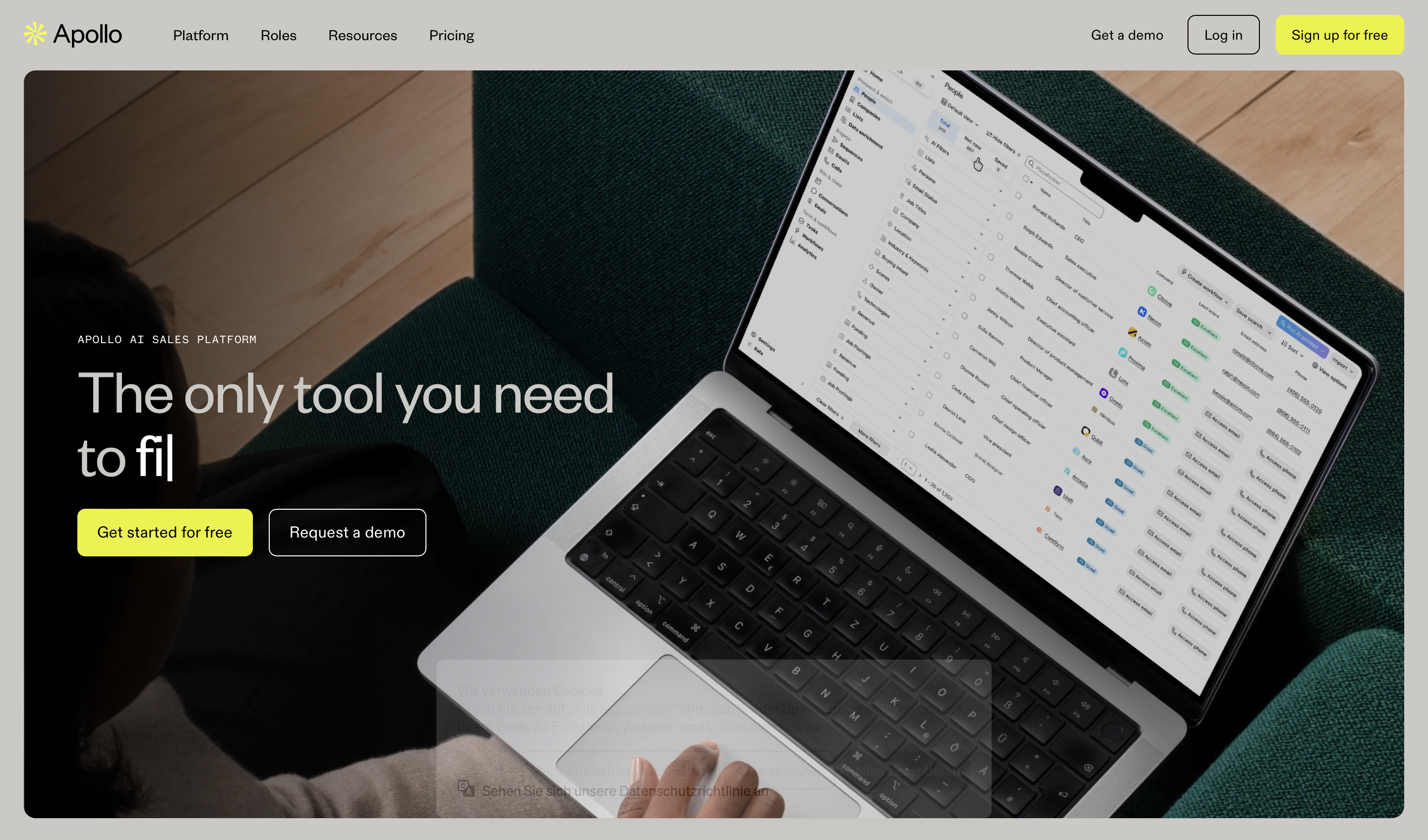
Apollo.io combines B2B data with sales engagement capabilities, offering a unified platform for prospecting and outreach. This integration appeals to teams seeking to consolidate their sales technology stack.
Core strengths compared to Adapt:
Apollo.io provides built-in email sequencing, and campaign analytics alongside contact data. Teams can discover prospects, enrich their information, and launch outreach campaigns without switching between multiple tools.
The platform maintains a substantial proprietary database of over 200 million contacts, offering consistent data structure and formatting. This standardization simplifies integration with existing CRM systems and reporting workflows.
Key considerations compared to Databar.ai:
Single data source dependency means gaps in coverage that can't be filled through alternative providers. When Apollo.io lacks specific contact information, users must manually search elsewhere or accept incomplete data.
The integrated approach can feel restrictive for teams with established sales engagement workflows or specialized outreach requirements that don't align with Apollo.io's built-in capabilities.
Best use cases: Teams starting fresh with sales automation or those seeking to replace multiple disparate tools with a single platform find Apollo.io most valuable.
3. ZoomInfo
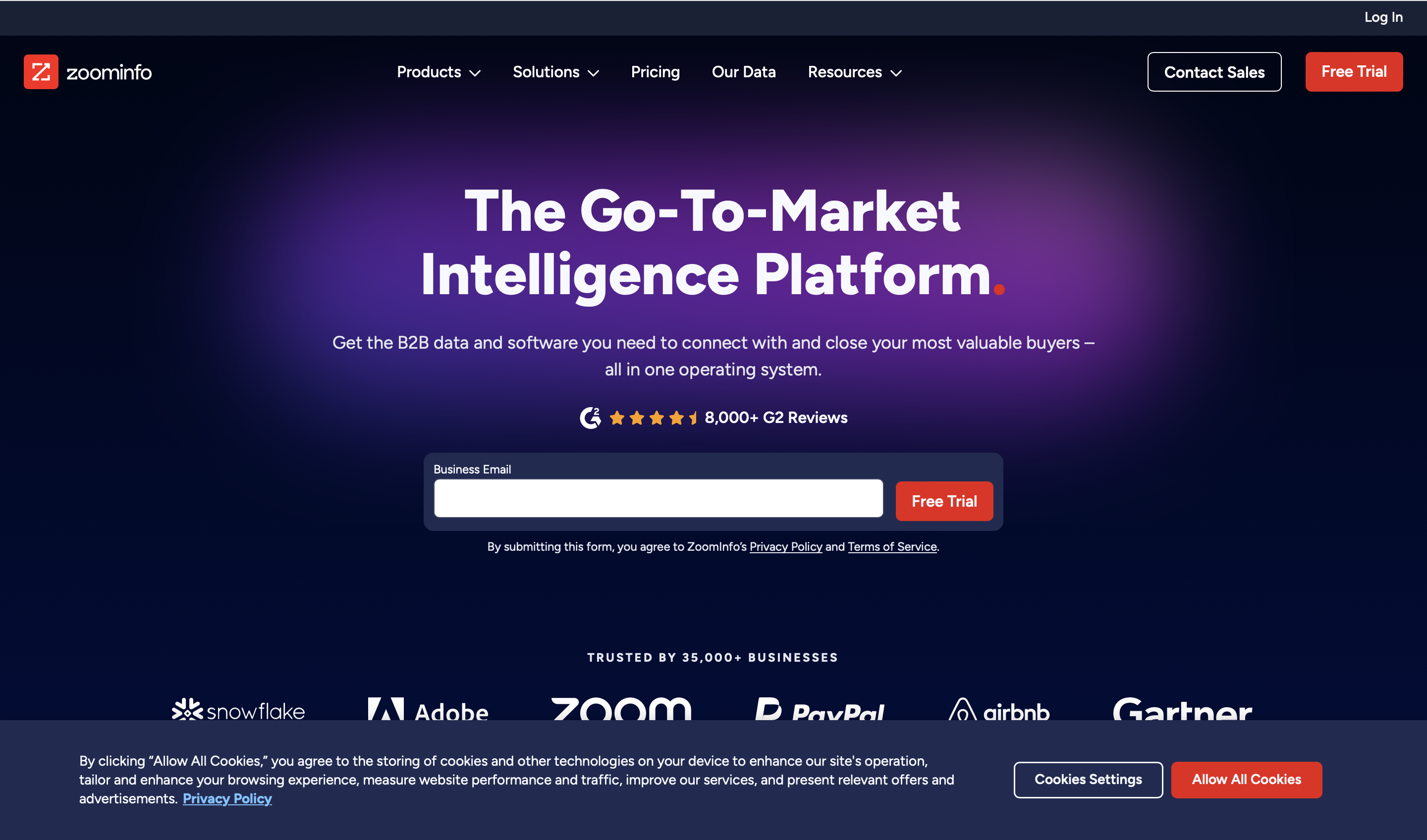
ZoomInfo has established itself as the enterprise standard for B2B contact and company information, particularly in North American markets. The platform offers extensive data depth and advanced intent intelligence.
Enterprise-focused advantages:
ZoomInfo's massive proprietary database includes detailed company hierarchies, technographic information, and buying intent signals that help identify accounts actively researching solutions.
Advanced search capabilities allow filtering by highly specific criteria including technology usage, company growth indicators, and organizational changes that signal buying opportunities.
Investment considerations for many teams:
Pricing starts around $15,000 annually for basic access, with comprehensive packages often exceeding $40,000 yearly. This enterprise focus puts ZoomInfo out of reach for smaller teams and growing businesses.
Implementation complexity requires dedicated sales operations resources and often takes weeks to deploy effectively across larger organizations.
When ZoomInfo makes sense: Large enterprise sales teams with substantial budgets and dedicated operations support find ZoomInfo's depth valuable for complex, high-value sales cycles.
4. Clearbit
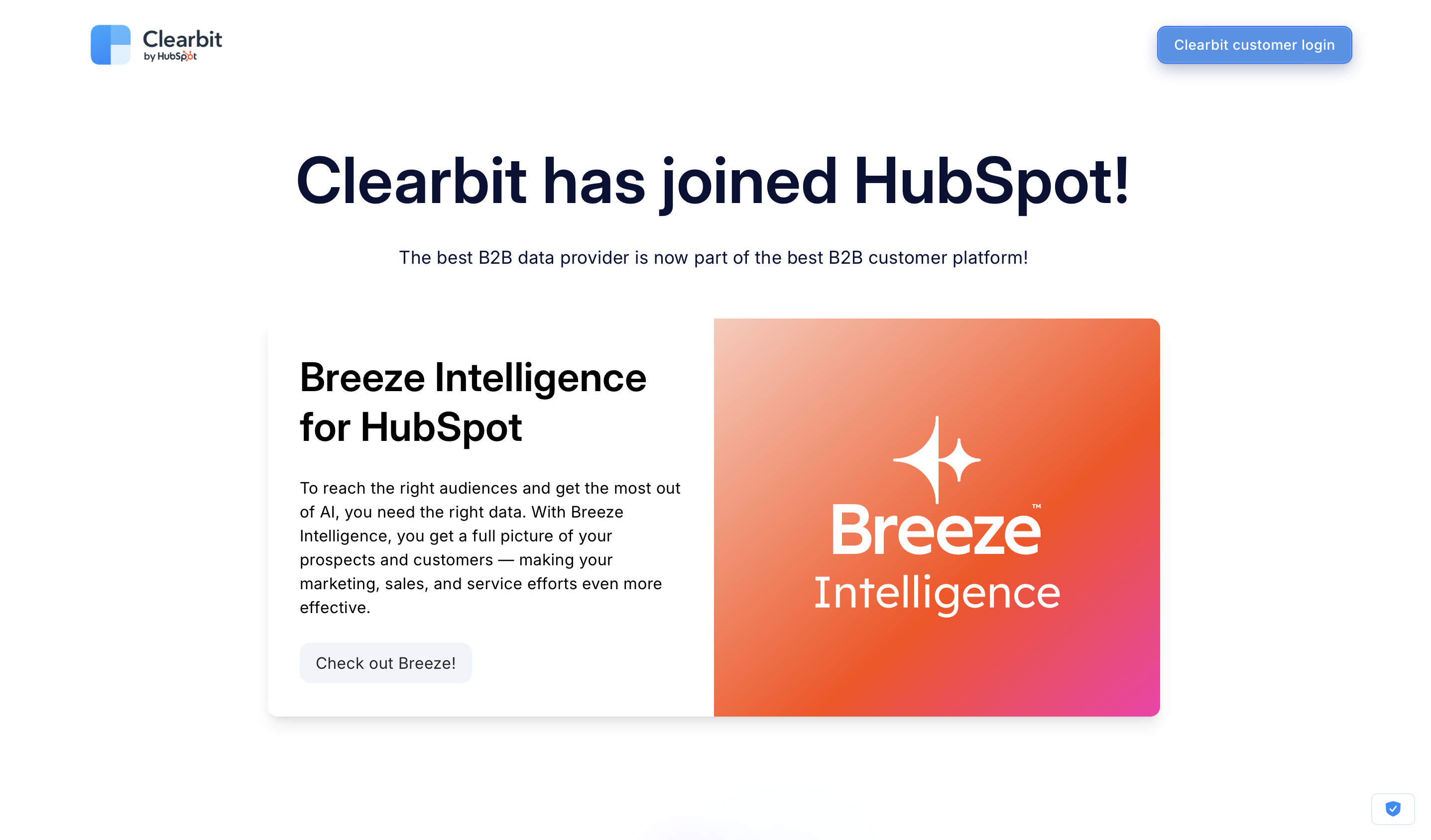
Clearbit specializes in real-time data enrichment through robust APIs, appealing to organizations with mature technical infrastructures and development resources.
Technical integration strengths:
Real-time enrichment capabilities automatically enhance lead data as it enters CRM systems, marketing automation platforms, and custom applications.
Website visitor identification helps marketing teams understand anonymous traffic and personalize experiences based on company and individual attributes.
Implementation requirements:
Clearbit's API-first approach requires technical expertise for optimal deployment. Teams without development resources may find it challenging to fully utilize the platform's capabilities.
The focus on enrichment rather than discovery means teams still need separate solutions for building initial prospect lists.
Ideal scenarios: Organizations with strong technical teams seeking to embed data enrichment directly into existing workflows find Clearbit's approach valuable.
5. Lusha
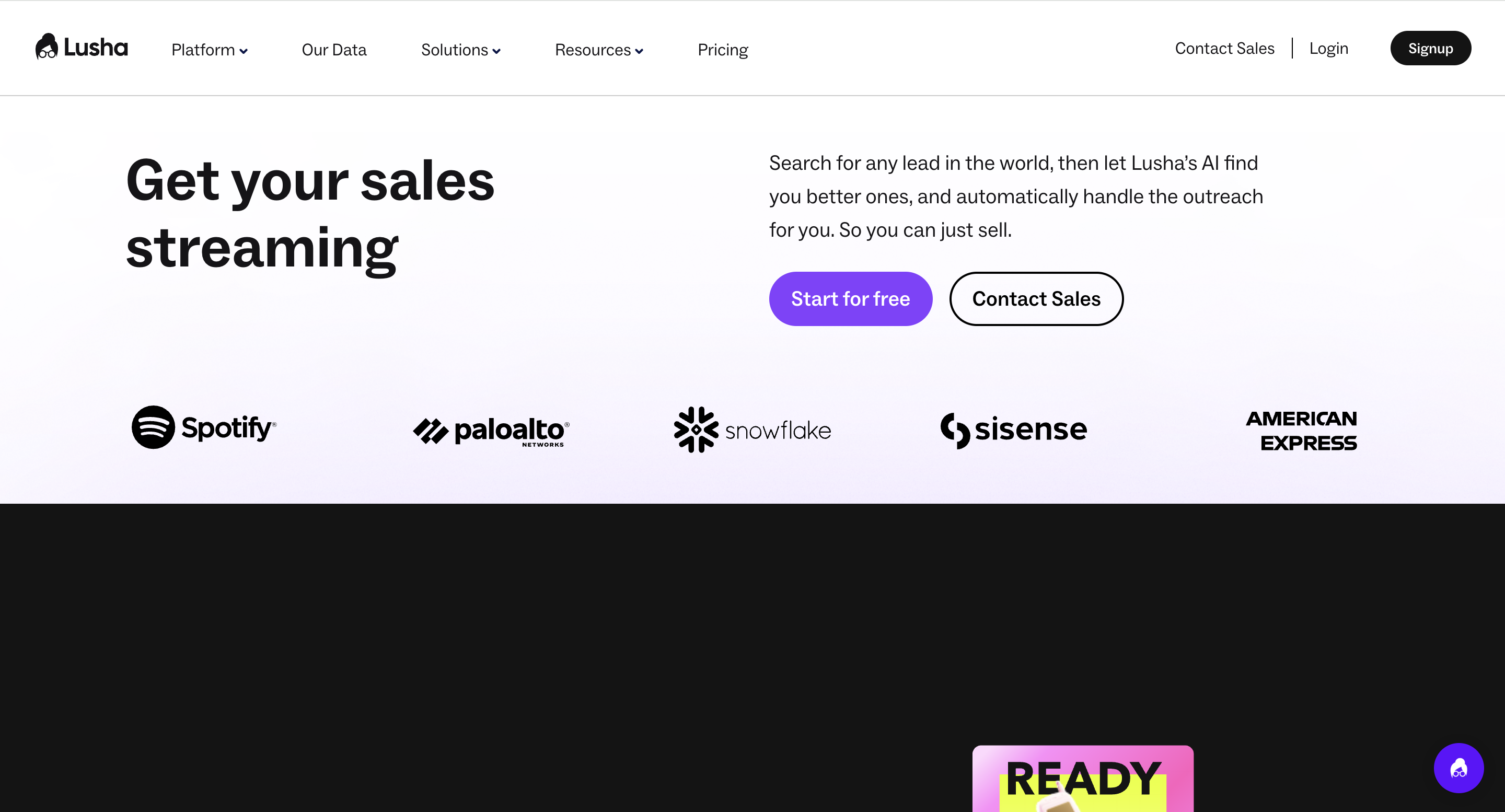
Lusha positions itself as a user-friendly contact discovery solution, emphasizing simplicity and immediate access to professional contact information.
Simplicity advantages:
The browser extension provides instant contact lookup while browsing LinkedIn profiles and company websites, requiring minimal learning curve or technical setup.
Transparent credit-based pricing allows teams to control costs by paying only for contacts they actually use, starting at $29 monthly.
Coverage and depth considerations:
Lusha's focus on simplicity means fewer data sources and less comprehensive information compared to multi-provider platforms like Databar.ai.
International coverage varies significantly, with stronger performance in North American and Western European markets.
Best fit: Individual sales professionals and small teams prioritizing ease of use over comprehensive data coverage find Lusha sufficient for basic prospecting needs.
6. Hunter.io
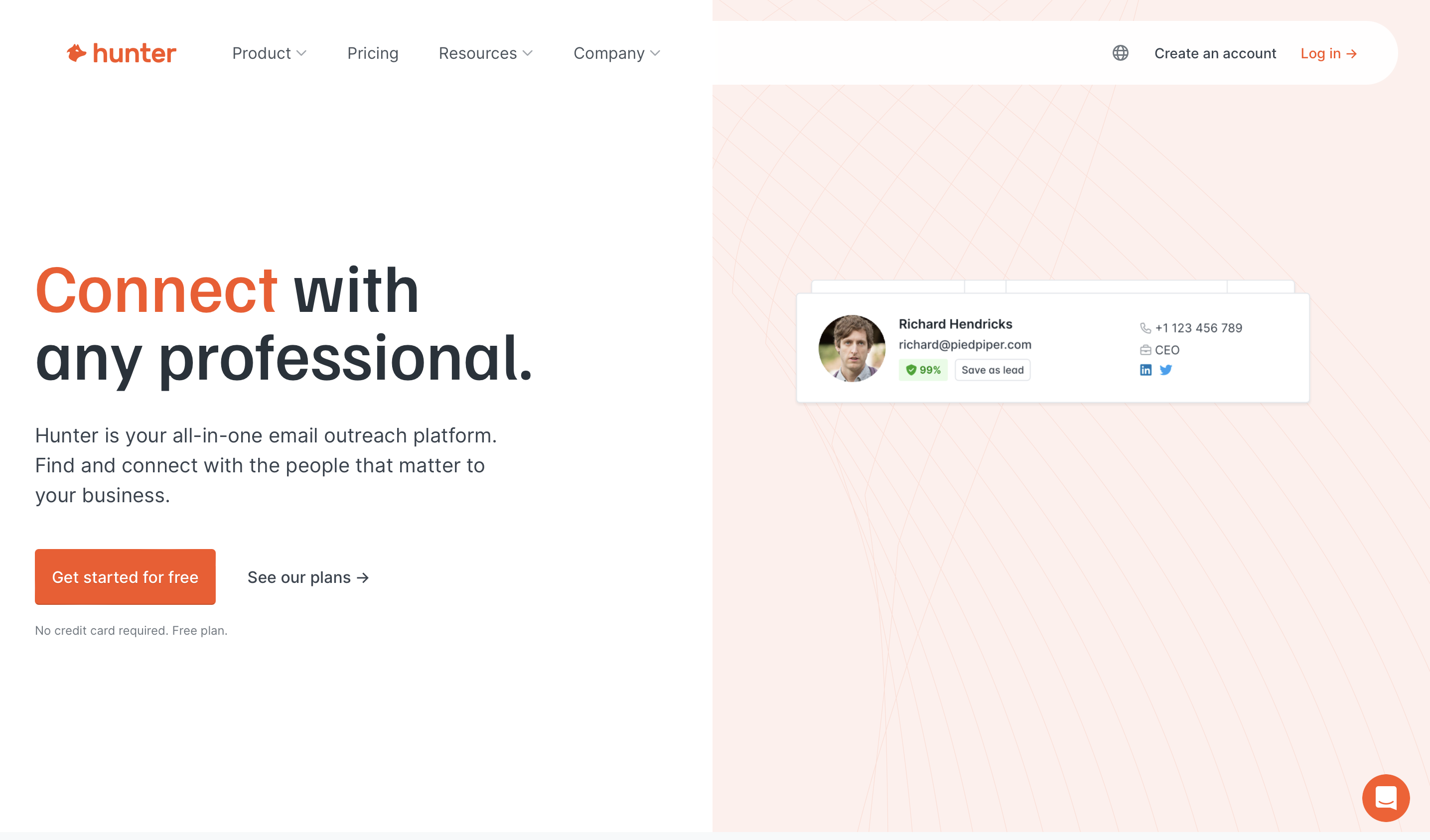
Hunter.io focuses specifically on email discovery and verification, offering deep expertise in this particular data category.
Email-focused excellence:
Industry-leading email verification technology helps maintain sender reputation by identifying invalid addresses before outreach campaigns.
Domain search capabilities reveal all email addresses associated with specific companies, useful for account-based prospecting approaches.
Functional scope:
The narrow focus on email data means teams need additional tools for phone numbers, social profiles, and comprehensive company information.
Limited enrichment capabilities beyond contact information may restrict usefulness for teams needing detailed prospect intelligence.
Appropriate use cases: Teams with email-centric outreach strategies or those needing specialized email verification alongside other data providers find Hunter.io valuable as a complementary tool.
➔ Get going with Hunter.io inside Databar.ai now with our native integration.
7. Seamless.AI
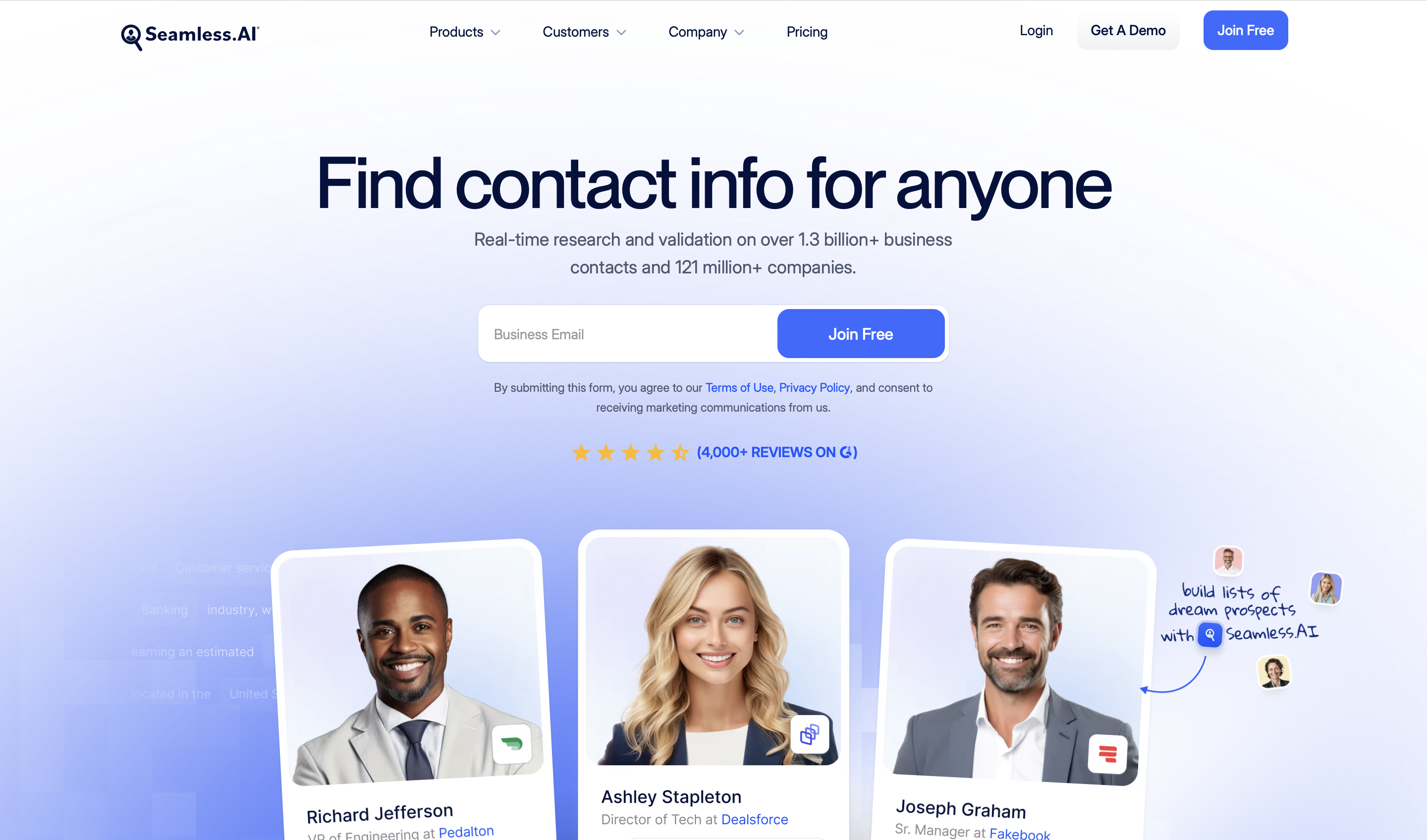
Seamless.AI differentiates itself through real-time contact verification and AI-powered search capabilities designed to find the most current professional information.
Real-time verification benefits:
Continuous data checking helps maintain accuracy by identifying outdated information and updating contact details as professionals change roles or companies.
AI-powered search attempts to locate contacts even when traditional databases lack information, potentially finding prospects missed by other platforms.
Scalability and cost considerations:
Unlimited search models can provide good value for high-volume users, though pricing structures may not suit teams with variable or seasonal prospecting needs.
The focus on real-time verification requires more processing time compared to pre-verified database approaches.
Team fit: Sales organizations with high-volume prospecting needs and tolerance for longer search times may appreciate Seamless.AI's verification-focused approach.
8. RocketReach
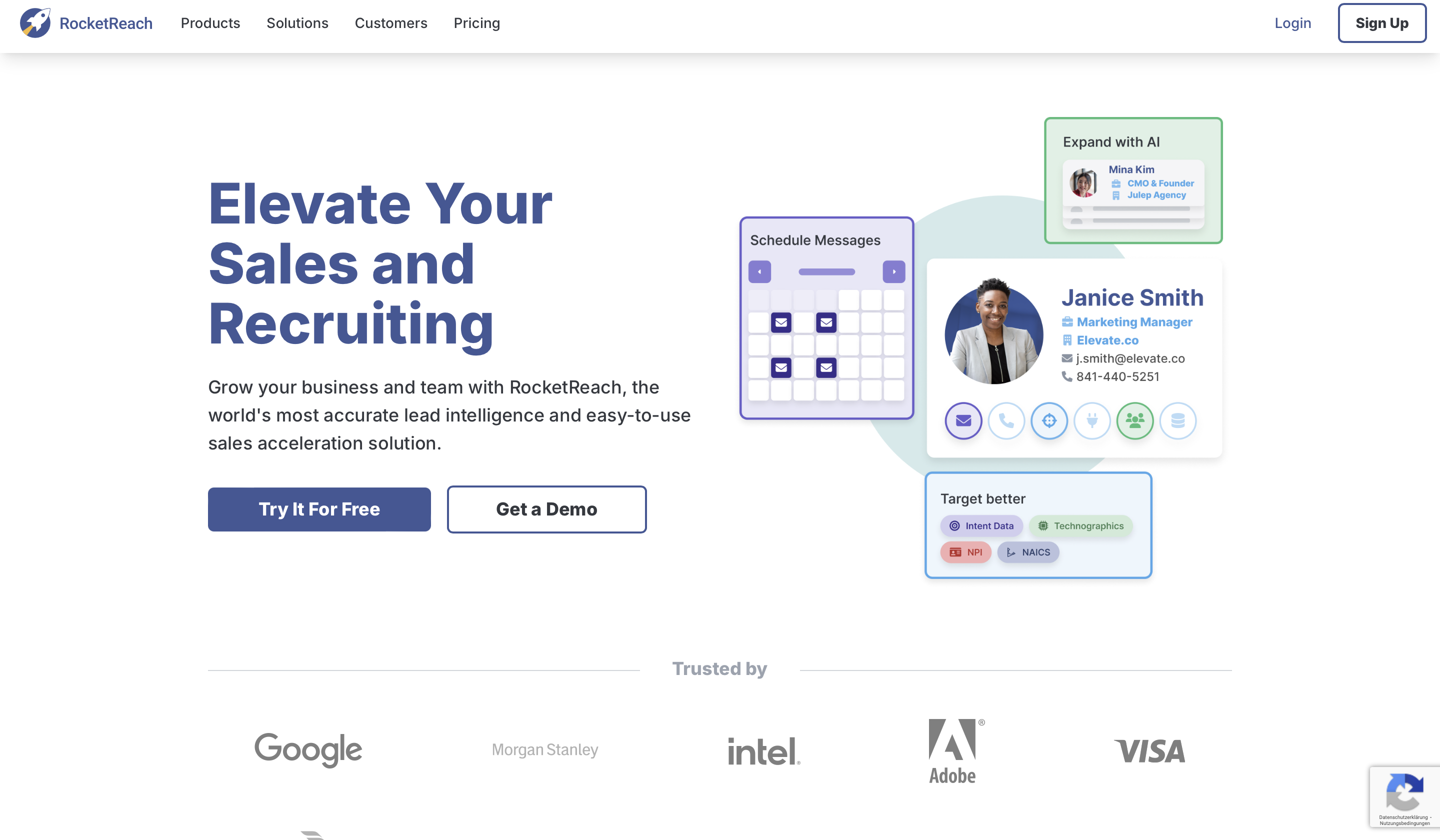
RocketReach emphasizes comprehensive professional profiles that include contact information, social profiles, and career history for relationship-based selling approaches.
Relationship intelligence advantages:
Detailed professional backgrounds help sales teams understand prospect career paths, educational backgrounds, and professional connections for more personalized outreach.
Strong mobile phone data coverage supports teams prioritizing direct calling over email-based prospecting.
Database and coverage considerations:
Reliance on a single proprietary database creates coverage gaps similar to other single-source providers, though with particular strength in professional networking data.
Search precision varies depending on industry and geographic region, with stronger performance in technology and professional services sectors.
Strategic applications: Teams using relationship-based selling methodologies or those requiring detailed professional background information find RocketReach's approach valuable.
➔ Access RocketReach natively inside Databar now.
9. UpLead
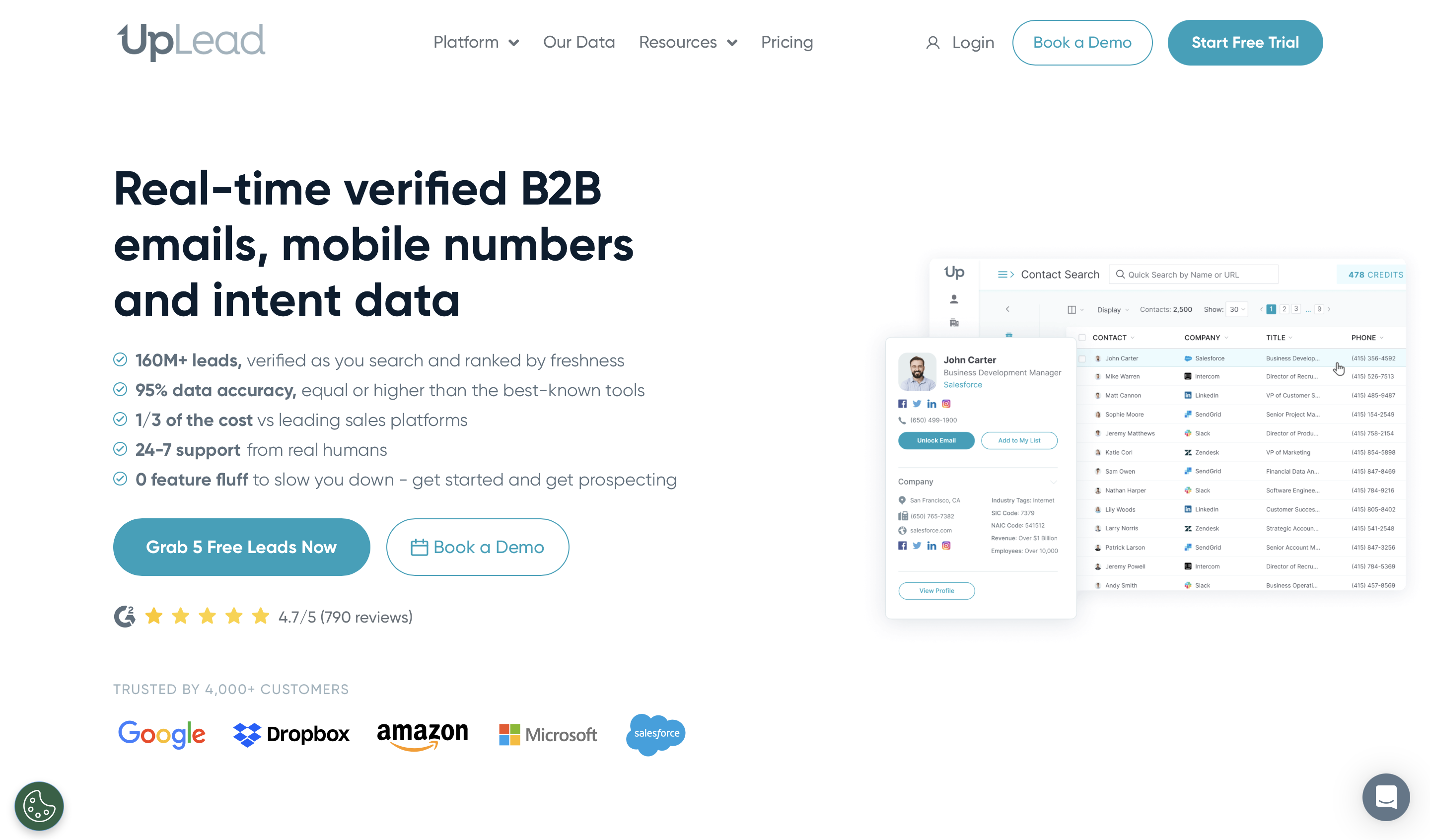
UpLead emphasizes data accuracy through real-time verification, offering guarantees on contact validity to support deliverability-focused outreach campaigns.
Verification-centered approach:
Real-time email and phone verification at the point of export helps teams maintain clean contact lists and avoid deliverability issues.
Credit-based pricing only charges for verified, valid contacts, providing cost protection against invalid data.
Scope and integration considerations:
Focus on verification over discovery means fewer options for finding contacts when initial searches don't yield results.
Limited workflow automation capabilities require teams to handle enrichment and verification as separate manual steps.
Optimal scenarios: Teams with established prospect sources needing high-confidence contact verification find UpLead's guarantee model appealing.
➔ Access UpLead from within Databar — integrated natively for you.
10. Cognism
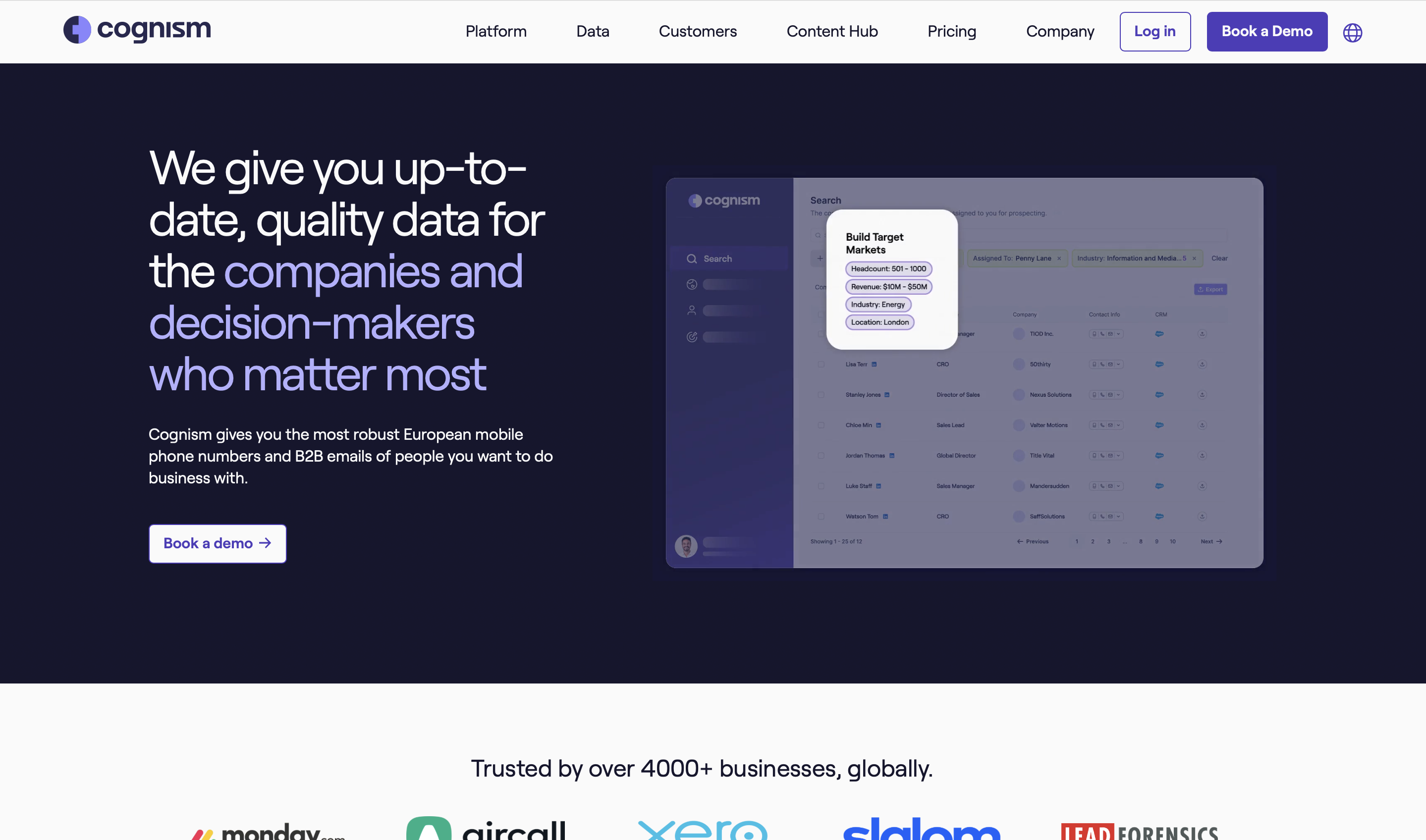
Cognism addresses the growing need for privacy-compliant B2B data, particularly valuable for organizations operating in regulated markets or multiple international jurisdictions.
Compliance and global coverage strengths:
Built-in GDPR compliance framework provides transparency about data sources and processing, crucial for European operations and multinational organizations.
Strong international coverage, particularly in European and APAC markets, serves teams expanding beyond North American focus.
Investment and complexity factors:
Premium positioning and enterprise focus mean higher costs compared to alternatives designed for smaller teams or specific use cases.
Compliance features add complexity that may exceed requirements for teams operating primarily in less regulated markets.
Regulatory scenarios: Organizations with significant European operations or strict compliance requirements find Cognism's regulatory focus valuable despite higher investment requirements.
➔ Review a side-by-side comparison of Databar.ai and Cognism.
B2B data quality and coverage determine prospecting success rates. In case you're wondering how we compare to other products when evaluating Adapt alternatives, understanding different data approaches becomes essential.
Our multi-provider approach vs ZoomInfo highlights how different data strategies serve various team needs and budget requirements. When considering Databar.ai's approach vs Apollo.io, teams can evaluate whether multi-source flexibility or integrated platforms better fit their workflows. For global operations, how our platform differs from Cognism shows how various providers address international data requirements differently.
Feature Comparison: How These Alternatives Stack Up
Understanding how each platform performs across critical categories helps teams make informed decisions based on their specific priorities and requirements.
Data Coverage and Quality: Databar.ai leads through multi-source aggregation, providing the highest match rates by accessing 90+ specialized providers. ZoomInfo offers the deepest single-source coverage but with gaps that can't be filled through alternative sources. Apollo.io provides solid general coverage while specialized platforms like Hunter.io excel in specific data categories.
Pricing and Value: Databar.ai offers transparent and flexible pricing, starting at $39 monthly with clear credit consumption. Lusha provides accessible entry-level pricing for basic needs. ZoomInfo requires significant enterprise investment while platforms like Clearbit and Cognism target mid-market to enterprise budgets.
Integration Capabilities: Databar.ai and Clearbit lead in API flexibility and custom integration options. Apollo.io provides good CRM connectivity within its integrated approach. ZoomInfo offers robust enterprise integrations while simpler platforms like Lusha focus on browser-based access.
Global Coverage: Databar.ai excels internationally through regional data providers. Cognism provides strong European coverage with compliance features. ZoomInfo is strong in the North American markets while other platforms show variable international performance.
Ease of Use: Lusha and Hunter.io offer the simplest learning curves for basic contact discovery. Databar.ai balances advanced capabilities with intuitive workflows. Enterprise platforms require more substantial training investments.
Strategic Recommendations: Choosing the Right Adapt Alternative
The optimal Adapt alternative depends entirely on your team's specific requirements, existing technology stack, and growth trajectory.
For Small Businesses and Startups (Under 50 employees): Databar.ai provides the best combination of advanced capabilities and accessible pricing. Small teams gain access to enterprise-level data quality without enterprise complexity or cost. The platform scales naturally as teams grow without requiring migration to different tools.
The multi-source approach particularly benefits small teams who can't afford to miss potential prospects due to data coverage gaps. Starting at $39 monthly with transparent credit usage, teams can predict and control costs while accessing the same data sources used by larger enterprises.
For Mid-Market Companies (50-500 employees): Databar.ai again emerges as the optimal choice, offering the flexibility to create sophisticated data workflows that adapt as processes evolve. Mid-market teams often have complex, specialized requirements that benefit from customizable multi-source data access.
Teams at this stage frequently need to balance cost efficiency with advanced capabilities. Databar.ai's approach provides enterprise-grade functionality without the enterprise price tag, allowing investment in other critical sales and marketing tools.
For Enterprise Organizations (500+ employees): Large enterprises should evaluate Databar.ai's Enterprise tier alongside ZoomInfo, considering compliance requirements, integration complexity, and dedicated support needs. Databar.ai's multi-source approach often provides better global coverage for international operations.
Enterprise teams with substantial budgets and dedicated sales operations resources might find ZoomInfo's depth valuable for complex, high-value sales cycles. However, many enterprises discover that Databar.ai's flexibility and cost efficiency deliver superior ROI even at scale.
For Specific Use Cases:
Teams prioritizing email-centric outreach should consider Hunter.io as a specialized tool or might want to use Hunter.io directly inside Databar.ai's platform.
Organizations with strict compliance requirements, particularly in European markets, benefit from Cognism's regulatory focus or Databar.ai's GDPR-compliant multi-source approach.
Sales teams seeking integrated prospecting and engagement might evaluate Apollo.io, though many find combining Databar.ai's superior data quality with specialized engagement tools delivers better results.
Implementation Best Practices: Making the Switch from Adapt
Successfully transitioning from Adapt to a more capable alternative requires strategic planning to minimize disruption while maximizing the benefits of improved data quality and platform capabilities.
Assessment and Planning Phase: Begin by auditing your current Adapt usage patterns, identifying which features your team uses most frequently and where current limitations create the biggest obstacles. Document specific pain points like data coverage gaps, integration challenges, or pricing concerns that drive the need for change.
Establish success metrics that will measure improvement after implementation. These might include data match rates, time spent on manual research, integration efficiency, or cost per qualified lead generated.
Platform Testing and Validation: Take advantage of free trials to test alternatives with your actual target market and use cases. Generic demos rarely reveal how platforms perform with your specific industry, geographic focus, or prospect types.
Run parallel testing for at least two weeks, comparing results between Adapt and your preferred alternative. Pay particular attention to data quality, coverage gaps, and workflow efficiency improvements.
Technical Integration Planning: Work with your sales operations and IT teams early in the evaluation process to understand integration requirements, API capabilities, and data migration needs. Some transitions require simple CSV exports while others benefit from direct CRM integration.
Plan for any necessary training or workflow adjustments, particularly if moving to a platform with significantly different capabilities or user interface design.
Migration Execution: Implement changes gradually rather than switching everything simultaneously. Start with a small team or specific use case to validate the new approach before expanding to full deployment.
Maintain access to Adapt during the transition period to handle any urgent needs while teams adapt to new workflows and verify that the alternative platform meets all requirements.
Optimization and Scaling: Monitor usage patterns and results during the first month to identify optimization opportunities. Many teams discover new capabilities or workflow improvements that weren't apparent during initial evaluation.
Document best practices and successful approaches to facilitate training for new team members and ensure consistent usage across the organization.
Migration Checklist
Making the switch from Adapt or any other platform doesn't have to disrupt your sales operations. This proven 7-day migration process has helped hundreds of teams transition smoothly while immediately improving their data quality and prospecting results.
Day 1-2: Assessment and Setup Start by cataloging your current workflows and identifying which data sources you rely on most heavily. Create your free Databar.ai account and run parallel tests using your actual prospect lists. Focus on testing the same industries, job titles, and geographic regions you typically target.
Many teams discover immediate improvements during this initial testing phase. The multi-source approach often finds contacts that traditional databases missed, while also providing additional data points like verified mobile numbers and social profiles.
Day 3-4: Integration Planning Connect Databar.ai to your existing CRM and sales engagement tools. The platform's one-click integrations work with major systems like Salesforce, HubSpot, Outreach, and Salesloft. Test the data flow to verify that enriched contacts sync properly with your existing fields and workflows.
Configure your preferred data providers within Databar.ai based on your target markets. European teams might prioritize GDPR-compliant sources, while North American teams can leverage the broadest possible provider network.
Day 5-6: Team Training and Workflow Optimization Train your sales team on Databar.ai's interface and capabilities. Most teams find the learning curve minimal, especially compared to complex enterprise platforms. Focus on showing reps how to build prospect lists, enrich existing contacts, and export data to their preferred tools.
Create templates for your most common prospecting scenarios. Databar.ai's workflow builder allows you to save multi-step processes, making it easy for team members to replicate successful research patterns.
Day 7: Full Migration and Optimization Complete the transition by updating any automated workflows that previously relied on Adapt. Most teams will maintain their access to the old platform for another week to handle any edge cases while confirming that Databar.ai meets all requirements.
Monitor your key metrics during the first week: data match rates, time spent on research, and overall prospecting efficiency. Teams typically see immediate improvements in all three areas, with some reporting 50% faster list building and 40% higher email deliverability rates.
Post-Migration Success Metrics Track these KPIs to measure your migration success:
- Data match rate improvement: Most teams see 20-40% increases
- Research time reduction: Average 3-4 hours saved weekly per rep
- Contact accuracy: Higher email deliverability and phone connection rates
- Cost efficiency: Lower per-contact costs through optimized provider usage
Common Migration Wins Teams frequently discover capabilities they didn't expect during migration. The AI research agent often replaces hours of manual company research, while the global data coverage opens new market opportunities that weren't feasible with Adapt's limitations.
Sales operations teams particularly appreciate the transparency and predictability of Databar.ai's credit-based pricing, making budget planning and ROI calculations more straightforward than custom pricing approaches.
Frequently Asked Questions About Adapt Alternatives
How does multi-source data access compare to single database providers? Multi-source platforms like Databar.ai access dozens of specialized data providers, dramatically increasing match rates and data coverage. Single database providers like Apollo.io or ZoomInfo may have extensive collections but create unavoidable gaps when they lack specific contacts. Multi-source approaches fill these gaps by checking alternative providers, often achieving 40-60% higher success rates for finding complete contact information.
What's the real cost difference between these alternatives? Costs vary significantly based on usage patterns and team size. Databar.ai starts at $39 monthly with transparent credit consumption, making it accessible for small teams while scaling efficiently for larger organizations. ZoomInfo typically requires $15,000+ annually for basic access. Apollo.io charges $49 per user monthly. The key is evaluating total cost including any necessary add-ons, integration costs, or complementary tools required for complete functionality.
How complex is it to integrate these tools with existing CRM and sales stacks? Integration complexity varies dramatically between platforms. Databar.ai offers both no-code integrations for common tools and robust API access for custom implementations. Clearbit excels at API-first integration but requires technical expertise. Apollo.io provides good CRM connectivity within its integrated approach. Simpler tools like Lusha focus on browser-based access with basic CRM export capabilities.
Conclusion: Selecting Your Optimal B2B Data Solution
The B2B data environment in 2025 offers compelling alternatives to Adapt's current offerings, each addressing specific needs that modern sales teams encounter. While Adapt provides basic lead intelligence capabilities, the market has evolved to offer more sophisticated, flexible, and cost-effective solutions.
Databar.ai emerges as the standout choice for most sales teams, combining the best aspects of multiple approaches: access to 90+ specialized data providers, transparent pricing starting at just $39 monthly, advanced automation capabilities, and global coverage that adapts to specific market needs. The platform's multi-source approach directly addresses Adapt's core limitation of single-source dependency while providing enterprise-grade capabilities at accessible price points.
For teams seeking integrated solutions, Apollo.io offers solid value by combining data with engagement tools, though at the cost of data flexibility and coverage. Enterprise organizations with substantial budgets may find ZoomInfo's depth valuable for complex sales cycles, while specialized tools like Hunter.io or Lusha serve specific use cases effectively.
The key insight is that successful B2B data strategy in 2025 requires flexibility, accuracy, and global coverage that single-source providers may struggle to deliver. Multi-source platforms like Databar.ai represent the new standard of sales intelligence, offering the adaptability and comprehensiveness that modern sales teams need to compete effectively.
Ready to experience superior B2B data quality? Join hundreds of sales teams who've already upgraded from limited single-source providers to Databar.ai's comprehensive multi-source approach. Start your free trial today and discover why teams consistently report 40-60% higher match rates and significantly improved prospecting results.
No credit card required. Full access to 90+ data providers. See the difference data coverage makes for your sales results.
Related articles

How to Build Claude Code Skills for GTM (With Templates)
Master GTM Automation with Step-by-Step Claude Code Skill Templates
by Jan, February 26, 2026

Claude Code for GTM Engineers: The Practical Guide to Building Campaigns in 2026
How GTM engineers can save time and boost accuracy with Claude Code
by Jan, February 25, 2026
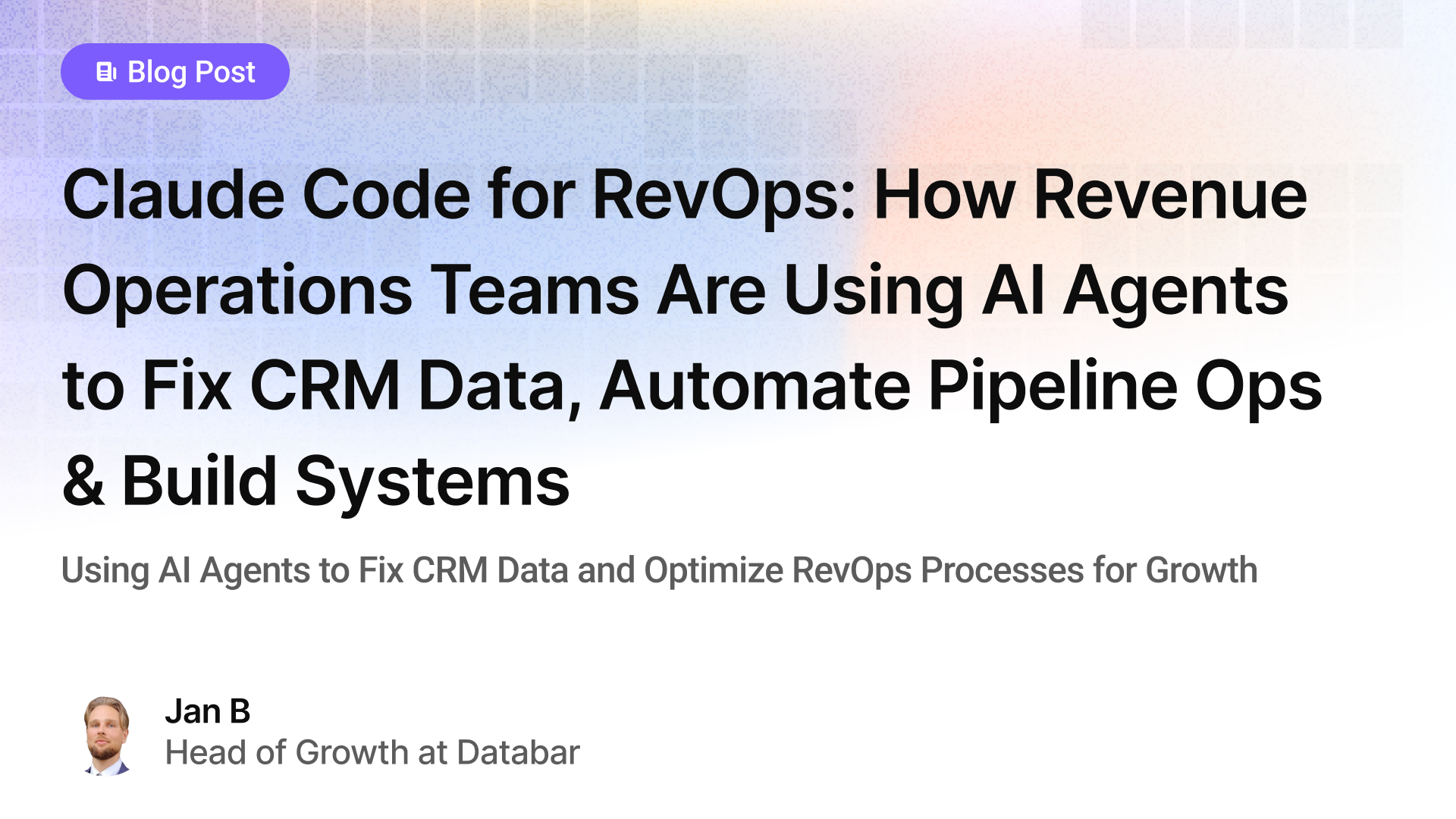
Claude Code for RevOps: How Revenue Operations Teams Are Using AI Agents to Fix CRM Data, Automate Pipeline Ops & Build Systems
Using AI Agents to Fix CRM Data and Streamline Revenue Operations for Scalable Growth
by Jan, February 24, 2026
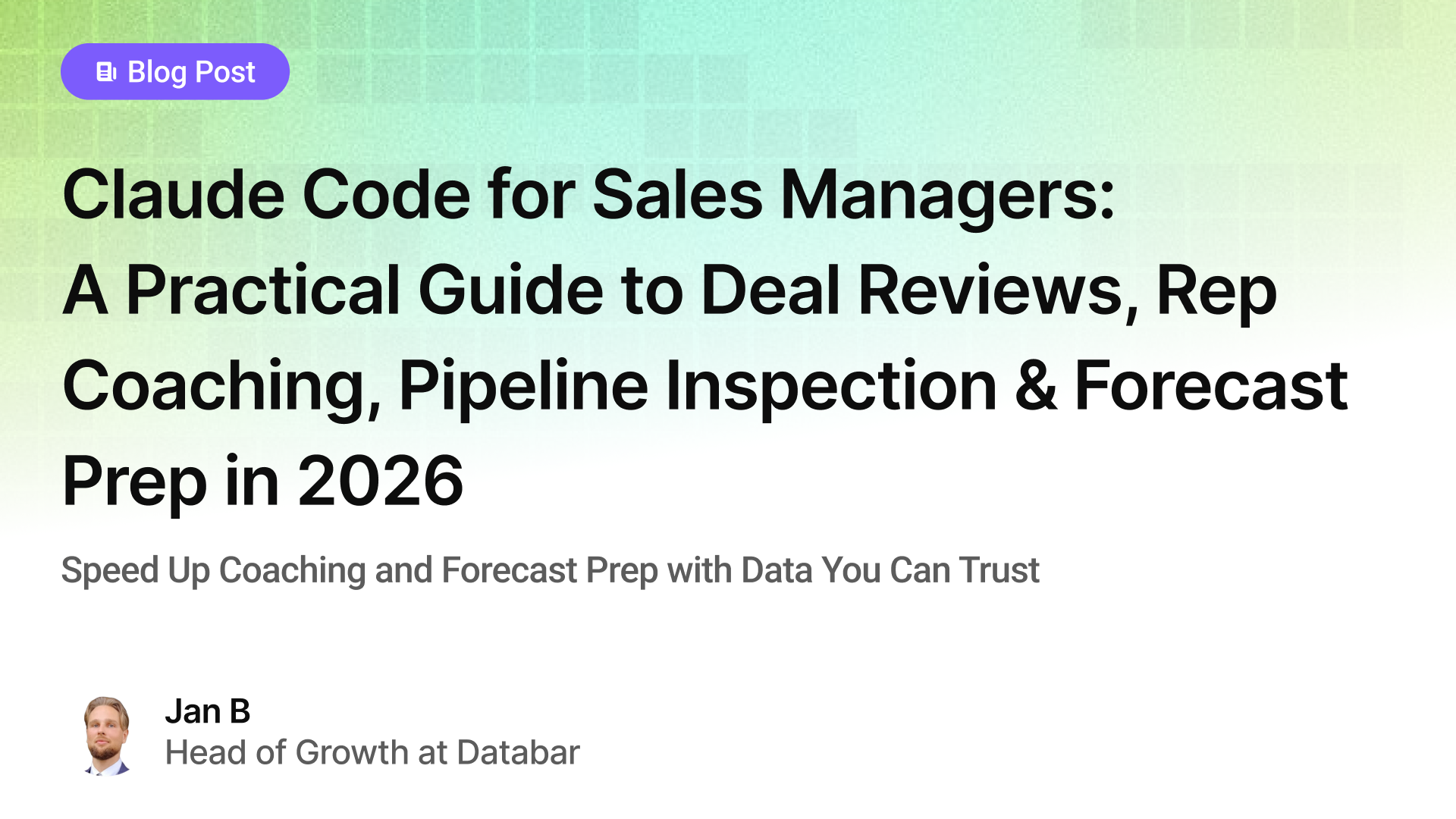
Claude Code for Sales Managers: A Practical Guide to Deal Reviews, Rep Coaching, Pipeline Inspection, and Forecast Prep in 2026
Speed Up Coaching and Forecast Prep with Data You Can Trust
by Jan, February 23, 2026